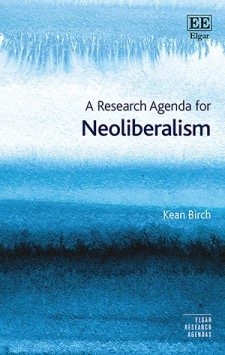In A Research Agenda for Neoliberalism, Kean Birch seeks to bring clarity to the ubiquitous use of ‘neoliberalism’ as a term in academic and popular discourse, looking at how analysts from across the political spectrum have understood this concept. The book does a valuable job of establishing the contours of existing discussions of neoliberalism, finds Christopher May, and would be an excellent resource for readers within and beyond the academy.
A Research Agenda for Neoliberalism. Kean Birch. Edward Elgar Publishing. 2017.
Neoliberalism has become a term that is more often used than fully understood in academic discussions, popular writings on the economy and/or the news media. There is a large and growing library of books on the subject, yet still students from undergraduate to PhD level, as well as academics and other commentators, use the term as if we all knew what it meant, and as a catch-all prejudicial accusation levelled at any aspect of the contemporary political economy they find unacceptable or malign.
In this new book, A Research Agenda for Neoliberalism, Kean Birch seeks to do something about this situation. Across three sections, Birch seeks to define neoliberalism, survey the current debates that problematise such attempts at definition and set out three strands for future research. As Birch notes immediately, the book is not intended to be about neoliberalism, but rather how we – by which he means analysts from across the political spectrum – understand neoliberalism. Self-avowedly approaching the subject as someone who is ambivalent about the concept and sceptical of its analytical utility, Birch sets himself the challenge of trying to rescue something of interest from debates about neoliberalism.
Birch first attempts to assemble a history of the idea of neoliberalism. This is made all the harder because those now most often identified by their critics as neoliberals (such as the attendees of the World Economic Forum last month, or Birch argues, economists like Robert Frank or Steven Levitt) generally avoid the term altogether. Birch’s survey of a range of various attempts to establish a – or the – history of neoliberalism leads him to identify eight interweaving strands: the Austrian; British; Chicago (I); Chicago (II); French; Italian/Bocconi; Ordoliberal/Freiburg; and Virginia strands. While some might disagree as to which ‘schools’ really are neoliberal – for instance, there is considerable debate about the fit between ordoliberal approaches and other neoliberalisms – equally this mapping is unlikely to find anyone complaining that a particular element has been omitted. Birch then takes the reader through his explanation of different ways of ‘thinking like a neoliberal’ by exploring how the market is conceived (and facilitated/supported) in various approaches. Central to his account is the neoliberal argument that far from being natural, the market as an economic allocation mechanism needs to be constructed and supported by state actions and, most obviously, legal institutions.
 Image Credit: Hong Kong Stock Exchange, 2013 (See-ming Lee CC BY 2.0)
Image Credit: Hong Kong Stock Exchange, 2013 (See-ming Lee CC BY 2.0)
Having established the historical contours of neoliberalism, Birch then moves to examine analyses of neoliberalism. Noting that there is a common tendency (especially in more journalistic accounts) to criticise a neoliberal straw man, he again sorts through the academic literature to find seven main perspectival clusters: Michel Foucault and governmentality; Marxism and class analysis; ideational analysis; the history and philosophy of economics; institutional analysis; state theory and the regulation school; and neoliberalisation, human geography and the processual perspective. Although quite short sub-sections, each contains a useful guide to representative literature and a thumbnail sketch of the analytical commitments shared by those collected together in each cluster. As will be clear from this summary of its first half, the text is certainly an excellent resource, and will provide those with a wide range of books and articles on their shelves with some useful taxonomical hints and tips. However, for the neophyte arriving at neoliberalism having perhaps been mystified by the term’s use, this will have been a swirl of information that may merely cause such a reader to put their head in their hands.
Possibly anticipating this response, Birch’s next chapter discusses the ambiguities and tensions within these debates to try and explain why the field looks how it does. However, as Birch concludes, if you are going to use the term in your writing, it is not now possible to merely shrug and ignore these issues: rather, what is required, as he consistently argues, is a clear understanding of one’s own definition of neoliberalism. At this point, if you have developed a good idea about what you think neoliberalism is and are comfortable with its complexity, you might be wondering what you can do with your newfound appreciation. Therefore, the final section of the book asks what new areas of research into neoliberalism might prove most fruitful and constructive.
Firstly, Birch argues that neoliberalism has a problem with the corporation (and specifically corporate monopolies). While early neoliberals had regarded all monopolies as suspect be they corporate- or labour-based, later neoliberals have focused mainly on the monopoly effects in labour (i.e. unionisation), and have been relatively relaxed about market distortions flowing from monopolistic or oligopolistic corporate control of markets. Rather than lead political economic developments like the rise of the finance sector or the dismantling of anti-trust regulations, neoliberals have actually merely followed a corporate-led agenda of social transformation. Thus, what is required is a much more nuanced and detailed account of how neoliberalism has both been facilitated by the rise of big business, but also how it has legitimated and supported such developments (for instance, via business schools), and why.
Using a similar logic, Birch’s second research theme asks a related set of questions about the normative triumph of entrepreneurship and the (re-)establishment of a rentier economy. Finally, he argues, too often accounts of neoliberalism and the law have focused on the centrality of property rights, when actually what is required is a much more detailed understanding of the role of contract law in modern capitalism and how neoliberals have sought to use contracts as a tool for the depoliticalisation of economic relations.
Overall then, Birch’s book is full of valuable detail and insight: it is hardly a substitute for many of the works he cites, but it does an important job of establishing the contours of the discussion of neoliberalism in such a way that anyone reading it will be unlikely to lapse into the lazy straw man forms of commentary which remain all too evident both within and beyond the academy. While as yet there is no paperback, the (cheaper) e- book would be an excellent purchase for any students on degrees or postgraduate programmes with substantial elements of political economy. As it is, if you are teaching political economy, you would likely find this a remarkably useful book to have on your desk (even at the current hardback price).
This review originally appeared at the LSE Review of Books. Amendment: The review was amended on 17 February 2018. The original post did not acknowledge the existence of an e-book version; this was changed.
Please read our comments policy before commenting.
Note: This article gives the views of the authors, and not the position of USAPP– American Politics and Policy, nor of the London School of Economics.
Shortened URL for this post: http://bit.ly/2sxSiF2
——————————————–
About the reviewer
Christopher May – Lancaster University
Christopher May is Professor of Political Economy at Lancaster University, UK. His most recent book is Global Corporations in Global Governance (Routledge 2015) and he is currently editing The Edward Elgar Research Handbook on The Rule of Law (2017). He has published widely on the interaction between law and political economy, and wrote the first independently authored study of the World Intellectual Property Organisation. Read more by Christopher May.


 Find this book:
Find this book: 



